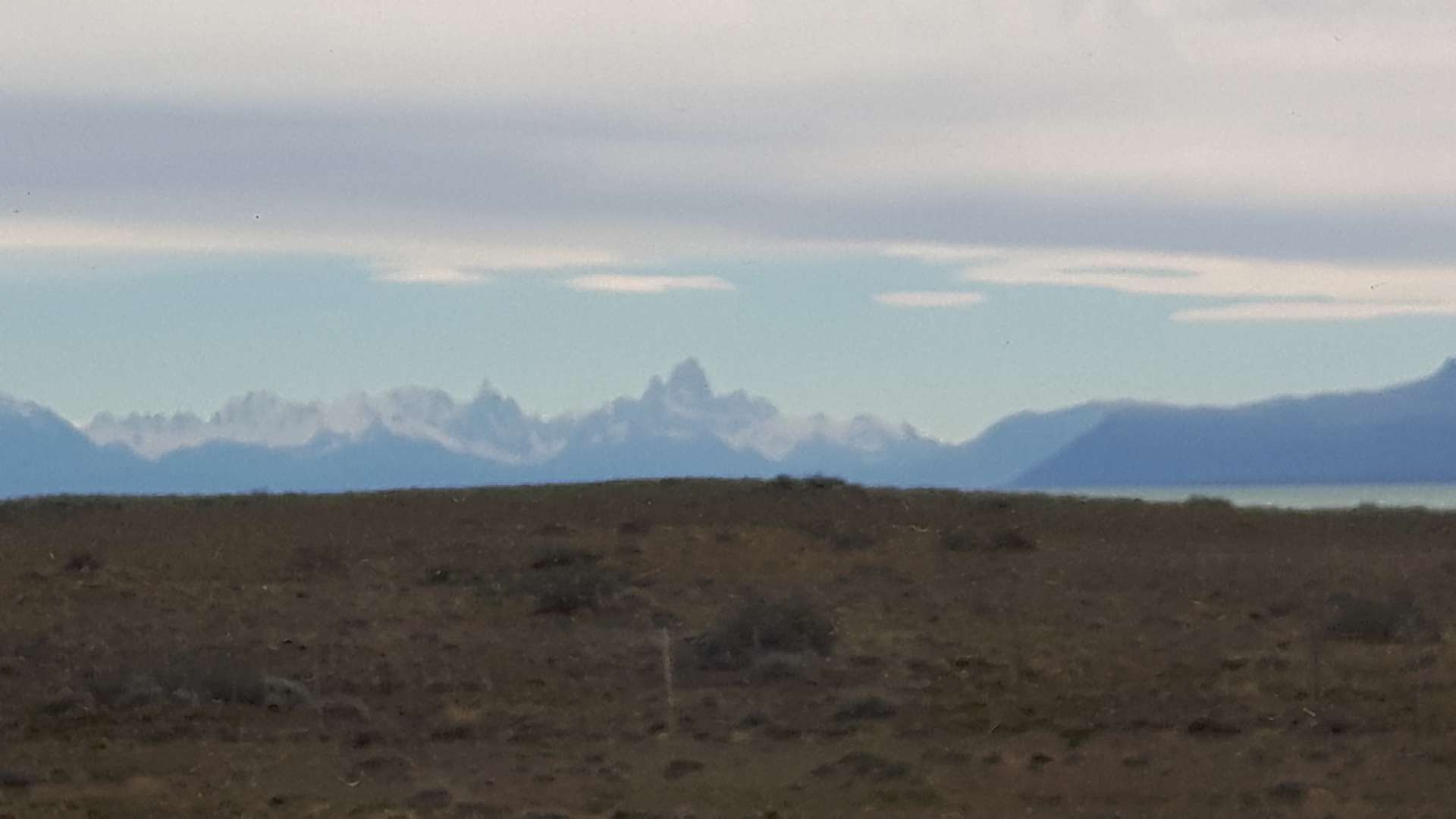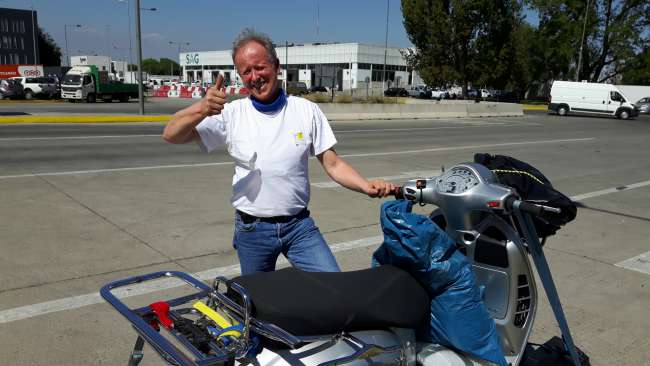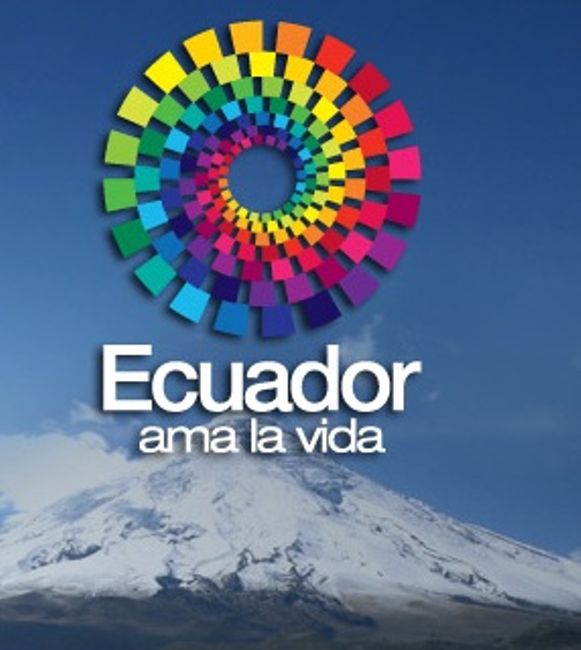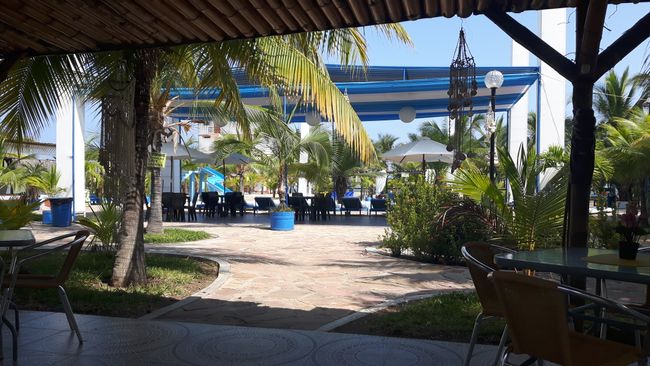01.09.: Machala / Ecuador
প্ৰকাশিত: 03.09.2017
নিউজলেটাৰ চাবস্ক্ৰাইব কৰক
01.09.
'like on television...' is my first thought as I sit on the breakfast terrace of my hotel complex and wait for breakfast. Everything is perfect. The palm trees rustle in the wind, a wonderful calm surrounds me, even though the Pan-American Highway is only 500 meters away. The ground is paved with granite slabs, beautiful furniture - I feel like I'm in a resort somewhere in Western Europe.
The breakfast is continental, the three rolls are for people with dentures who forgot them in the toothbrush cup on the bedside table, but there is freshly squeezed orange-banana juice, salted butter, and tea.
The wifi works here, so I can upload my blog that I wrote yesterday - I take my time. Today, I only have a few kilometers to drive. I just want to go to Machala, the border town between Peru and Ecuador.
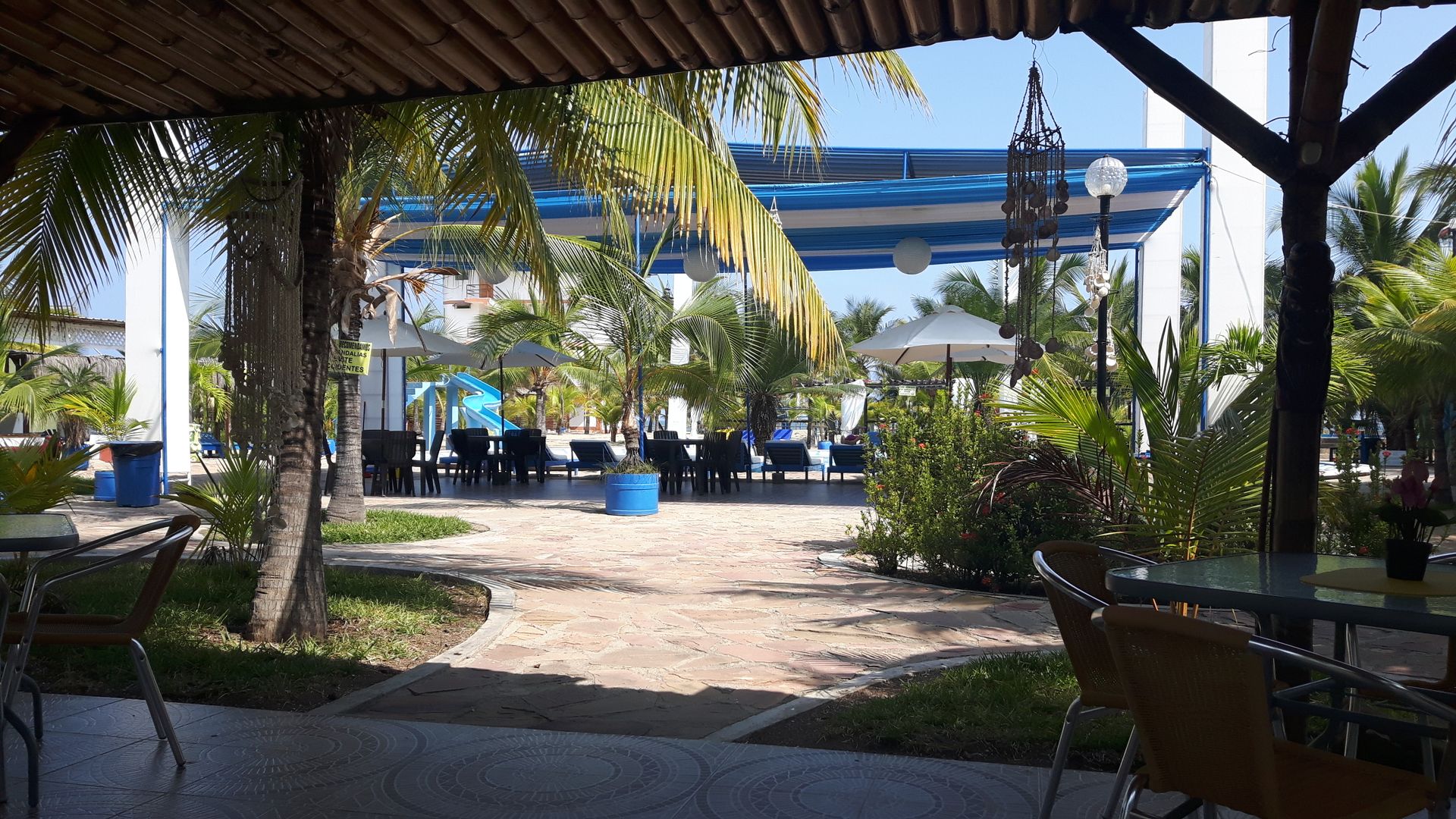
Tumbes is in a similar 'untidy' state as yesterday in the late afternoon. The bridge, too narrow for a road of the Pan-American Highway category, is the bottleneck of this late morning.
The traffic is crawling at a snail's pace across the bridge, and there is anarchy. There is no traffic light regulation and only one policeman who cannot handle this traffic avalanche.
At the beginning of the at least 5 km long traffic jam, there is still order and I adapt. It is a very hot day, made even hotter by the sweating engines of the trucks. When the first motor taxi - allowed - drives past me on the shoulder, I simply follow it. When it can no longer continue on this lane, I force myself onto the opposite lane, which is hardly used, and leave the beginning of the traffic jam behind me. I can already see that a few hundred meters of traffic are also jammed on the opposite lane and there is no way forward. The car drivers tolerate my zigzag lines, and I manage to get back onto the shoulder, hoping that there is a dirt road next to the bridge. There is one, but it is uncertain whether it is really passable. Meanwhile, four types of vehicles share the two lanes, one of which can barely accommodate a truck. There are trucks, cars, motorcycles, and motor taxis. They are all standing and pushing against and with the direction of traffic on the bridge.
That's how it seems to be every day at this time, Peruvians know each other and talk from car window to car window. If a motor taxi cannot let a delivery van pass, it is simply pushed back so that there is just enough space between the bumper and the motor taxi for a sheet of A4 paper. The passenger, in this case, a slightly plump woman, sits in the back of the tricycle and watches as the taxi driver tries to push the vehicle backwards.
And all of this happens in a stoic calm, there is no honking and no cursing, people accept their fate. In fact, there are drivers who turn off their engines, but the diesel engines continue to emit a smell and may be the reason for the slow-spreading lethargy. I also notice that I am switching to standby mode.
The policeman manages to gain respect, the traffic begins to move and pick up speed, I seize the first opportunity, accelerate, and weave past the slowly dissolving traffic jam, leaving the wheezing and stinking line of cars behind me.
Only a few want to go to the border, which surprises me. I would have expected to see the trucks again for one or two hours at the border crossing.
When I arrive, it's like a Sunday atmosphere. I slowly approach the two border officials and expect to be interrogated, but soon I realize that I am more of a nice pastime. I tell my stories and then roll into customs, where I need my exit stamp for the Vespa. That goes pretty quickly. Then I go to the immigration office, which is shared by Peruvian and Ecuadorian colleagues. 'Ecuador - ama la vida', greets me in large letters on the walls.
There are four counters, the first two are for exiting Peru, the other two are for entering Ecuador. There are a maximum of 10 people here, the processing is quick, no one wants to know anything or inspect my luggage on the Vespa for food or weapons - I am released from bureaucracy.
The drive to Machala, the first city after the border, takes me through lush green and fertile landscapes. Huge banana plantations spread out on both sides of the highway, then I see rice fields again and again, and there are signs asking consumers to buy things for their daily needs - whether consumable or non-consumable - in Ecuador. 'Ecuador first'? The government is keen to further reduce the trade deficit. In recent years, protective tariffs have been imposed on imported goods - including from the EU - which, according to the Foreign Office, will be phased out completely this year. Ecuador, whose export earnings are dominated by oil and agricultural products such as bananas and fish, is suffering from the decline in oil prices. The government is trying to influence the diversity of the economy and become less dependent on oil.
Since 2000, Ecuador has not had its own currency. The dollar has replaced the completely dilapidated sucre. With the introduction of the dollar, the economy has stabilized. The government no longer has any influence on monetary policy.
The traffic here is calmer and more disciplined than in Peru, the roads are in good condition except for a few potholes, there are many signs asking not to litter the streets. It seems to help, the roadside slopes are almost free of black plastic bags.
By 3:00 p.m., I am in Machala, which has about 220,000 inhabitants and is considered the banana capital of the world. Even the banana king and the banana queen are elected here, and an international fair of bananas and other agricultural products takes place once a year. Germany is the main importer of Ecuadorian bananas. The port of Puerto Bolivar is the transshipment point. There is a similar chaos here as in Tumbes, the streets are partly being repaved, my GPS is completely overwhelmed, my hostel platform iOverlander, which mainly offers hostels for cyclists, is also overwhelmed, so I eventually drive to the first hotel and book a room for $15 per night. The exchange rate is currently 0.84 euros for 1 dollar, so the overnight price of about 13 euros is reasonable. I can park the Vespa in the hotel garage, but unfortunately, there is only wifi downstairs in the lounge.
The city's planners seem to have been light-sensitive or water-shy creatures. All the shops do not align with the facade of the block of buildings, so that the shop windows and the employees get daylight, but they are all built into the respective building complex. While this has the advantage that pedestrians can make their purchases protected from rain and sun, it makes everything appear dark, eerie, and static. The street scene seems boring. The Plaza de Armas has been redesigned. Here, too, South Americans show their love for kitschy colors. But they have thought of something good. There is a water tunnel that is at least 10 meters long, through which the kids and also the fathers can run with fun and get more or less soaked.
I stock up on dollars and a new SIM card for my smartphone, try to find insurance for the Vespa but quickly give up because hunger sets the priorities.
The restaurant options are much fewer here than in Peru. After a long search, I decide on a Chinese restaurant. I manage to express my desire for fresh salad with lots of vegetables, etc., in a way that is almost understood. I receive a large bowl with various types of vegetables without the typical Chinese seasoning sauce, but dressed with onions, vinegar, and oil.
In the evening, I write some more and go to bed early because tomorrow will be a long day.
নিউজলেটাৰ চাবস্ক্ৰাইব কৰক
উত্তৰ
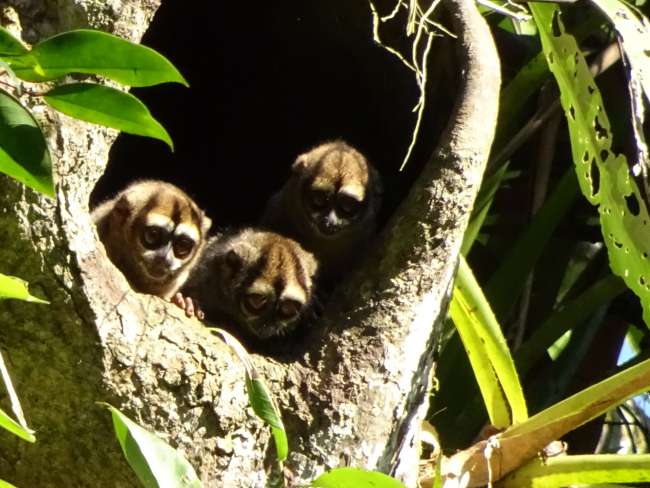
ভ্ৰমণৰ প্ৰতিবেদন ইকুৱেডৰ
